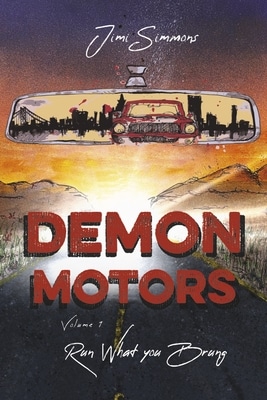Yeah, we got one, too.
Clients Crushin’ It: Jimi Simmons
Madison Utley speaks to author Jimi Simmons about writing the first volume of Demon Motors: Run What You Brung, starting in on volume two, and the important balance of finding your own way as a writer while remaining open to the right kind of support.
 Q: Talk to me about your writing past. What kind of experience did you have before working on this book?
Q: Talk to me about your writing past. What kind of experience did you have before working on this book?
A: My whole career has been in the film industry. Everybody I know writes a screenplay at some point. I hadn’t done any organized writing before, but I’ve always jotted down stories and things that happened that could be good to use later. But when I finally really sat down to write, the screenplay format felt like it was holding me back. I kept finding myself focusing on: “Where’s the camera? What location would this be shot in?” I was preoccupied with all the periphery stuff instead of character development.
Once I switched to a novel format, the storyline stopped feeling secondary. I wrote the majority of the book in two months. I locked myself in and really went for it. The characters are really an amalgamation of personality types I’ve known throughout my life, so I felt like I knew them and could work with them really well. I’d create a scenario and throw them into it and sort of write down their response. It flowed really easily. On the surface, Demon Motors is about the street racing scene in San Francisco, but lest that alienate readers thinking it’s just some gearhead talking about cars, I made sure the interpersonal part of it is really compelling too.
Q: Tell me the inception of the story.
A: This book started as a writing practice I used to get deeper into myself, really as a therapeutic thing. I was going through a pretty crazy time personally and I knew from past experience that nothing was going to change or stabilize until I turned inside and figured out the reasons for what was happening and changed it at the core level. So, in the beginning, it was quite a selfish thing. I was determined to get through the parts I needed to work on emotionally and if the story came out, the story came out. If it didn’t, it didn’t. I really did most of the work for myself. But then suddenly, what seemed like random stories and snippets and experiences began to look like they could be tied together. I just wasn’t exactly sure how though.
Q: What did you do at that point?
A: It was really important to me that the book be true to my vision and so I was hoping to find someone who could guide me and show me the way, while respecting that. I went to a few book fairs and met a bunch of people but it was just this sort of rote: “Well here’s what you need to do if you want to be an author.” Nothing was clicking. I tried tapping all resources available, but unfortunately none of them seemed to fit my style, my voice, or the story I wanted to tell.
Then I heard Stuart speak at a book fair in Boston and I was like, “I know this guy. This is one of my tribe.” We met up and he was just so supportive. His book, Blueprint Your Bestseller, was incredibly helpful because I had all of these half chapters and paragraphs and content that was related but scattered. Stuart showed me how I could put all of those pieces together into a story that made sense. But the thing I’m most proud of is that when people read this book, they say, “I can hear your voice through the whole thing. It sounds like you’re telling the story.” For me, that’s a huge compliment. That’s what I wanted. It brought the joy back into the process. There’s definitely going to be a Volume Two, which takes place about six years later. I’m a few chapters in and having a lot of fun with it.
Q: What advice would you give to a writer embarking on their first book project?
A: I explored almost every resource available to authors and at every turn, there was someone wanting to charge me money to show me how to be like everyone else. Maybe it was because of my age or my experience, but it was easy for me to say, “No, that might be the way it’s ‘supposed to be done,’ but my priority is telling my story my way.” So I’d say don’t wholly accept just anybody’s advice–mine included. Don’t think you need to do it the same way someone else did. Listen to what you know you need to do. Trust your gut and if something doesn’t feel right to you, then find another way to do it.
That said, at some point you’re going to need help or advice from someone you can trust. It can be hard to find that other voice that A, believes in you; B, has the experience necessary to give good advice; and C, can hear you and you can hear them. But it matters. Whether it’s a writing partner, somebody like Stuart, or a publisher, you need an advocate, that person on your side who will push you to be better while also reminding you: “This is good and this will work.”

Leave a Reply